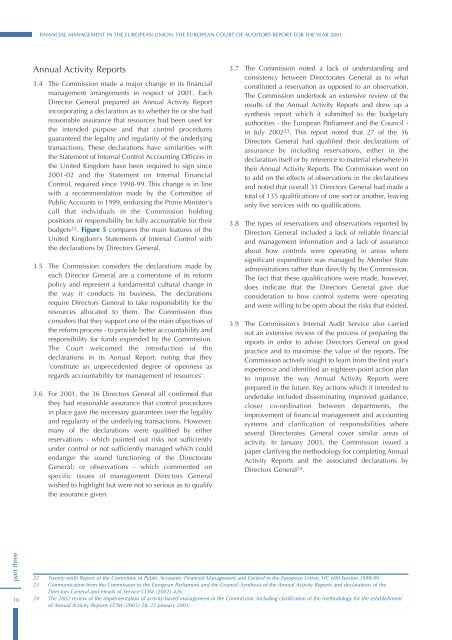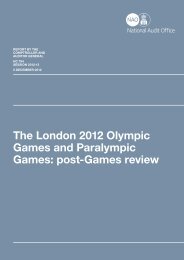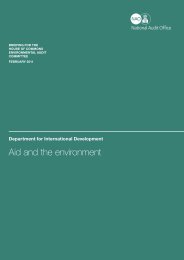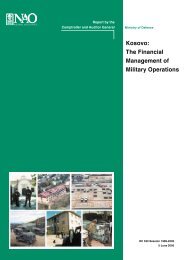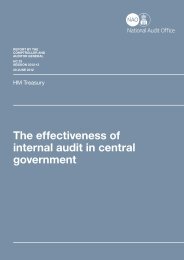Full report - National Audit Office
Full report - National Audit Office
Full report - National Audit Office
You also want an ePaper? Increase the reach of your titles
YUMPU automatically turns print PDFs into web optimized ePapers that Google loves.
FINANCIAL MANAGEMENT IN THE EUROPEAN UNION: THE EUROPEAN COURT OF AUDITORS REPORT FOR THE YEAR 2001<br />
Annual Activity Reports<br />
3.4 The Commission made a major change in its financial<br />
management arrangements in respect of 2001. Each<br />
Director General prepared an Annual Activity Report<br />
incorporating a declaration as to whether he or she had<br />
reasonable assurance that resources had been used for<br />
the intended purpose and that control procedures<br />
guaranteed the legality and regularity of the underlying<br />
transactions. These declarations have similarities with<br />
the Statement of Internal Control Accounting <strong>Office</strong>rs in<br />
the United Kingdom have been required to sign since<br />
2001-02 and the Statement on Internal Financial<br />
Control, required since 1998-99. This change is in line<br />
with a recommendation made by the Committee of<br />
Public Accounts in 1999, endorsing the Prime Minister's<br />
call that individuals in the Commission holding<br />
positions of responsibility be fully accountable for their<br />
budgets 22 . Figure 5 compares the main features of the<br />
United Kingdom's Statements of Internal Control with<br />
the declarations by Directors General.<br />
3.5 The Commission considers the declarations made by<br />
each Director General are a cornerstone of its reform<br />
policy and represent a fundamental cultural change in<br />
the way it conducts its business. The declarations<br />
require Directors General to take responsibility for the<br />
resources allocated to them. The Commission thus<br />
considers that they support one of the main objectives of<br />
the reform process - to provide better accountability and<br />
responsibility for funds expended by the Commission.<br />
The Court welcomed the introduction of the<br />
declarations in its Annual Report, noting that they<br />
'constitute an unprecedented degree of openness as<br />
regards accountability for management of resources'.<br />
3.6 For 2001, the 36 Directors General all confirmed that<br />
they had reasonable assurance that control procedures<br />
in place gave the necessary guarantees over the legality<br />
and regularity of the underlying transactions. However,<br />
many of the declarations were qualified by either<br />
reservations - which pointed out risks not sufficiently<br />
under control or not sufficiently managed which could<br />
endanger the sound functioning of the Directorate<br />
General; or observations - which commented on<br />
specific issues of management Directors General<br />
wished to highlight but were not so serious as to qualify<br />
the assurance given.<br />
3.7 The Commission noted a lack of understanding and<br />
consistency between Directorates General as to what<br />
constituted a reservation as opposed to an observation.<br />
The Commission undertook an extensive review of the<br />
results of the Annual Activity Reports and drew up a<br />
synthesis <strong>report</strong> which it submitted to the budgetary<br />
authorities - the European Parliament and the Council -<br />
in July 2002 23 . This <strong>report</strong> noted that 27 of the 36<br />
Directors General had qualified their declarations of<br />
assurance by including reservations, either in the<br />
declaration itself or by reference to material elsewhere in<br />
their Annual Activity Reports. The Commission went on<br />
to add on the effects of observations in the declarations<br />
and noted that overall 31 Directors General had made a<br />
total of 135 qualifications of one sort or another, leaving<br />
only five services with no qualifications.<br />
3.8 The types of reservations and observations <strong>report</strong>ed by<br />
Directors General included a lack of reliable financial<br />
and management information and a lack of assurance<br />
about how controls were operating in areas where<br />
significant expenditure was managed by Member State<br />
administrations rather than directly by the Commission.<br />
The fact that these qualifications were made, however,<br />
does indicate that the Directors General gave due<br />
consideration to how control systems were operating<br />
and were willing to be open about the risks that existed.<br />
3.9 The Commission's Internal <strong>Audit</strong> Service also carried<br />
out an extensive review of the process of preparing the<br />
<strong>report</strong>s in order to advise Directors General on good<br />
practice and to maximise the value of the <strong>report</strong>s. The<br />
Commission actively sought to learn from the first year's<br />
experience and identified an eighteen-point action plan<br />
to improve the way Annual Activity Reports were<br />
prepared in the future. Key actions which it intended to<br />
undertake included disseminating improved guidance,<br />
closer co-ordination between departments, the<br />
improvement of financial management and accounting<br />
systems and clarification of responsibilities where<br />
several Directorates General cover similar areas of<br />
activity. In January 2003, the Commission issued a<br />
paper clarifying the methodology for completing Annual<br />
Activity Reports and the associated declarations by<br />
Directors General 24 .<br />
part three<br />
16<br />
22 Twenty-ninth Report of the Committee of Public Accounts: Financial Management and Control in the European Union, HC 690 Session 1998-99.<br />
23 Communication from the Commission to the European Parliament and the Council: Synthesis of the Annual Activity Reports and declarations of the<br />
Directors General and Heads of Service COM (2002) 426.<br />
24 The 2002 review of the implementation of activity-based management in the Commission, including clarification of the methodology for the establishment<br />
of Annual Activity Reports COM (2003) 28, 21 January 2003.


